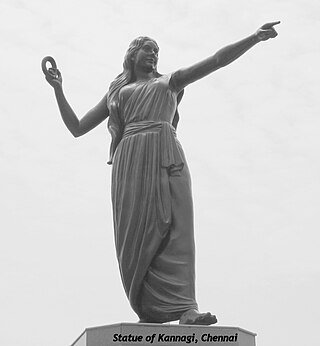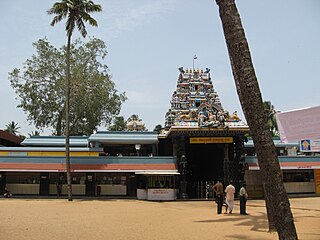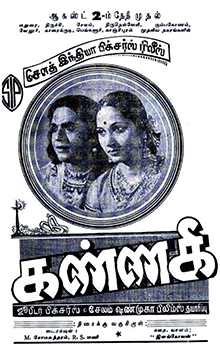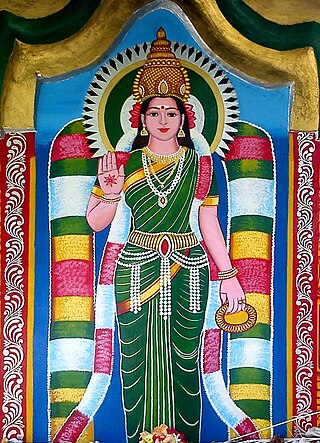
Kannagi sometimes spelled Kannaki, is a legendary Tamil woman who forms the central character of the Tamil epic Cilappatikaram. Kannagi is described as the chaste woman who stays with her husband despite his unfaithfulness, their attempt to rebuild their marriage after her husband had lost everything but repented, how her husband is falsely framed then punished without the due checks and processes of justice. Kannagi proves and protests the injustice, then curses the king and city of Madurai leading to the death of the unjust Pandyan King of Madurai, who had wrongfully put her husband Kovalan to death. The society that had made her suffer, suffers in retribution as the city Madurai is burnt to the ground because of her curse. In Tamil folklore, Kannagi has been deified as the symbol – sometimes as goddess – of chastity, with sculptures or reliefs in Hindu temples iconographically reminding the visitor of her breaking her anklet or tearing her bleeding breast and throwing it at the city.

Cilappatikāram, also referred to as Silappathikaram or Silappatikaram, is the earliest Tamil epic. It is a poem of 5,730 lines in almost entirely akaval (aciriyam) meter. The epic is a tragic love story of an ordinary couple, Kannaki and her husband Kovalan. The Cilappatikaram has more ancient roots in the Tamil bardic tradition, as Kannaki and other characters of the story are mentioned or alluded to in the Sangam literature such as in the Naṟṟiṇai and later texts such as the Kovalam Katai. It is attributed to a prince-turned-monk Iḷaṅkõ Aṭikaḷ, and was probably composed in the 5th or 6th century CE.

The Five Great Epics are five Tamil epics according to later Tamil literary tradition. They are Silappatikāram, Manimekalai, Cīvaka Cintāmaṇi, Valayapathi and Kuṇṭalakēci.
Savitri or Savithri may refer to:
Natrinai, is a classical Tamil poetic work and traditionally the first of the Eight Anthologies (Ettuthokai) in the Sangam literature. The collection – sometimes spelled as Natrinai or Narrinai – contains both akam (love) and puram category of poems. The Naṟṟiṇai anthology contains 400 poems, mainly of 9 to 12 lines, but a few with 8 to 13 lines each. According to Takanobu Takahashi – a Tamil literature scholar, the Naṟṟiṇai poems were likely composed between 100–300 CE based on the linguistics, style and dating of the authors. While Kamil Zvelebil – a Tamil literature and history scholar, dates some poems to the 1st century BCE. The Naṟṟiṇai manuscript colophon states that it was compiled under the patronage of the Pandyan king named Pannatu Tanta Pantiyan Maran Valuti, but the compiler remained anonymous.
Pattini, is considered a guardian deity of Sri Lanka in Sri Lankan Buddhism and Sinhalese folklore. She is also worshipped by Sri Lankan Tamil Hindus by the name of Kannaki Amman.
CheranChenkuttuvan, literally 'the Alluring Kuttuvan Chera', identified with Katal PirakottiyaVel Kezhu Kuttuvan, was the most celebrated Chera dynasty ruler of the early land of Tamilnadu in early historic South India.

Kovalan is a central character in Ilango Adigal's Silappatikaram, one of the ancient Tamil epics.
Kannagi was a Tamil language newspaper published in Tamil Nadu, southern India. The first copy was published on the initiative of former Indian National Army officer S. Sakti Mohan on 29 May 1952. It succeeded the publication Netaji, which had started in 1948. Soon it became the regional organ of the All India Forward Bloc in Tamil Nadu.

Madhavi is an important character in the Silapathikaram, one of the epics in Tamil literature. Silapathikaram is the first Kappiyam (epic) among the five in Tamil literature. It belongs to the Sangam Period. Madhavi was born in a lineage of dancers, and was an accomplished dancer. Madhavi is one of the three main characters in Silappatikaram, along with Kannagi and Kovalan.

Pungudutivu or Pungai Idu Tivu is a small island composed of number villages that is just west of the Jaffna Peninsula in Sri Lankan Tamil dominated Northern Province. It is divided into 12 wards internally, each corresponding a major settlement.

The Attukal Bhagavathy Temple is a Hindu religious shrine at Attukal in Kerala, India. Goddess Bhadrakali (Kannaki), mounted over 'vethala', is the main deity in this temple. Bhadrakali, a form of Mahakali, who killed the demon king Daruka, believed to be born from the third eye of lord Shiva. 'Bhadra' means good and 'Kali' means goddess of time. So Bhadrakali is considered as the goddess of prosperity and salvation. Goddess 'Attukal devi', itself is the supreme mother 'Bhaadrkali devi', the goddess of power and courage. She is often referred as Kannaki, the heroine of Ilanko Adikal's 'Silapathikaaram'. The temple is renowned for the annual Attukal Pongal festival, in which over three million women participate. A festival that has figured in the Guinness Book of World Records for being the single largest gathering of women for a religious activity, the Attukal Pongala continues to draw millions of women with each passing year. Attukal Temple is situated near the heart of the city, 2 kilometres away from Sree Padmanabhaswamy Temple, East Fort in Thiruvananthapuram. Devotees believe that all of their wishes will be fulfilled by the goddess, provide prosperity and can attain salvation. Attukal devi is often worshipped in 3 forms such as Maha Saraswati, Maha Lakshmi and Mahakali/ Parvathy.

Poothan and Thira is a ritualistic folk art performed mainly in the Valluvanad region of central Kerala in India, in which people dance in costumes representing Poothan is the lieutenant of Kali, and Thira, the goddess Kali, to the accompaniment of drummers. Thudi a small drum using for poothan, and heavy drum para accompanying thira.

Thambiluvil Kannaki Amman Kovil is one of the most significant Hindu temples in the Ampara District of Eastern Province, Sri Lanka. It is situated about 70 km south of Batticaloa town and 11 km south to Akkaraipattu. It is considered as one of the ancient temples of Mattakkalappu Desam made for Kannaki Amman, the heroine of the great Tamil epic Silappatikaram.
Maṇimēkalai, also spelled Manimekhalai or Manimekalai, is a Tamil-Buddhist epic composed by Kulavāṇikaṉ Seethalai Sataṉar probably somewhere between the 2nd century to the 6th century. It is an "anti-love story", a sequel to the "love story" in the earliest Tamil epic Silappadikaram, with some characters from it and their next generation. The epic consists of 4,861 lines in akaval meter, arranged in 30 cantos.
Kannaki (English: The Eye) is a 2002 Indian Malayalam-language tragedy film directed by Jayaraj and written by Sanjeev Kilikulam. It stars Nandita Das, Lal, Siddique, Kalpana, Geethu Mohandas and Manoj K. Jayan. It is an adaptation of William Shakespeare's play Antony and Cleopatra. This is Jayaraj's second film adaptation of a Shakespeare play, the first being Kaliyattam (1997). Lal plays Manickam, the equivalent to Antony. Nandita Das plays Kannaki, the equivalent to Cleopatra and Manoj K. Jayan plays Gounder, Octavius Caesar's role. Nandita Das' role as Kannaki was critically acclaimed and is considered one of her finest acting performances in her career.

Kannagi is a 1942 Indian Tamil-language epic film directed by R.S Mani based on one of The Five Great Epics of Tamil Literature, Cilappatikaram. This is the first Tamil film based on the epic. The second film, Poompuhar, was released later in 1964.

Kannaki Amman is the deified form of Kannagi, the heroine of the Tamil epic Cilappatikāram. She is primarly worshipped in Sri Lanka and Kerala, and in a minor way in few parts of Tamil Nadu. As a goddess of chastity, she is venerated by Indian Tamils and Malayalis, Sri Lankan Tamil Shaivites, and also by the Sinhalese Buddhists as Pattini Amma. In regional Hindu tradition, her tale is interpreted as the story of Durga demanding justice after the death of her husband, Kovalan, who is identified as a form of Shiva.

Paththini (පත්තිනි) is a 2016 Sri Lankan Sinhala-language epic-drama film written and directed by Sunil Ariyarathna and produced by Dr. Milina Sumathipala, co-produced by Jagath Sumathipala and Thilanga Sumathipala on behalf of Sumathi Films. The film features Pooja Umashankar in the title role, Uddika Premarathna in the lead role while Ravindra Randeniya, Lucky Dias, Veena Jayakody, and Aruni Rajapaksha appear in supporting roles. The film is based on the Tamil epic Silappatikaram, written by Ilango Adigal. The film was released on 5 May 2016 in the film halls of the EAP Circuit.

Kannagi statue is a statue at the Marina Beach, Chennai, India. It is located at the intersection of Bharathi Salai and Kamarajar promenade. On 2 January 1968, it was erected as Kannagi holding an anklet in her hand and demanding justice.











